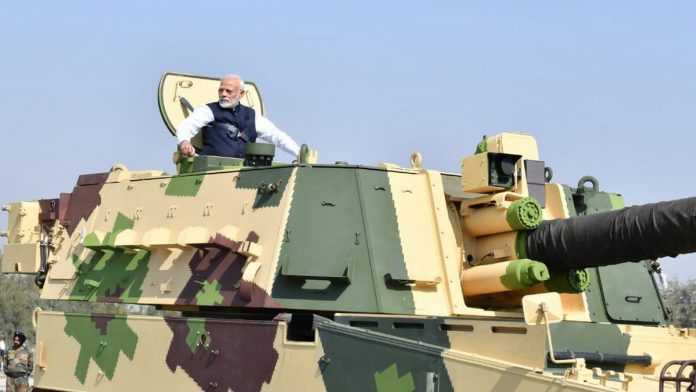NITIN PAI
Among the many disturbing issues that came up in the long, bitter election campaign over the past few months was one concerning the politicisation of the armed forces. It demands a dispassionate conversation, and now that the campaign is behind us, it is time to have one.
It is in India’s national interest that our armed forces — as an institution — be non-partisan, professional, and both keep out and be kept out of electoral politics, policy-making and administration. This is the formula that has allowed liberal democracies to protect individual rights, secure prosperity and wield formidable military power without being consumed by it. It is also a formula that served the Indian republic well when it was but an incipient democracy, and generations of our political and military leaders have played their part to keep the civil and military spheres in a state of connected separateness through the ups and downs of our post-Independence history. So, it’s important that we protect and preserve this relationship.
Because “war is politics by other means”, the armed forces are a political instrument and, in a broad sense, are inherently politicised. But when we talk about the politicisation of the armed forces, we are talking about a different kind of politicisation — their getting involved or dragged into domestic politics. The former includes partisanship, public demonstrations, interference in government, involvement in administration and outright capture of power. The latter includes politicians appropriating military causes, personnel and symbols to burnish their appeal to the citizens. And, as we have often seen in our neighbourhood, politicians can invite generals to share or seize power. Whether the politicisation happens at the behest of the politicians or the generals, it quickly corrodes the framework of the state, fatally undermining democracy and damaging military effectiveness.
When eight former service chiefs and scores of retired senior officers thought it necessary to write to the President of India, expressing their grave concern over the politicisation of the armed forces, we ought to take it seriously. The BJP and its supporters might have cleverly defused the significance of this move by veterans during the campaign, but now that Narendra Modi is back in power, it behoves his government to take a cold hard look at the substance of the arguments. Dismissing them merely because some of the supposed signatories recanted in front of television cameras, or because their email was not officially received by the President’s office would be to ignore red flags raised by some of the most responsible persons in uniform.
Campaign polemic might make it appear that politicisation is a yes/no situation, with one side contending that the armed forces have been politicised and the other rejecting the charge completely. In reality, politicisation lies on a spectrum and the veterans are telling us that the needle is moving towards the danger zone.
If political parties can compete on the basis of their track record on development, governance and welfare, they can also cite their achievements in national security and defence. Sure, ‘surgical strikes’ across the Line of Control have been ordered by previous governments too, but if Narendra Modi wanted to showcase the one he ordered, then there is nothing inherently wrong with it. So too the Balakot air strikes, although according to unconfirmed reports, the Indian Air Force decided to wait until the elections were over before revealing that we lost a helicopter crew to friendly fire, showing that its leadership caved in to political pressure.
Similarly, a democracy ought to live with the fact that its uniformed citizens have the right to vote and influence political outcomes just as anyone else. If some decide to participate in electoral politics — after a cooling off period — we should not raise eyebrows. Seven decades after Independence, our officer corps are increasingly representative of the society they are a part of, and will carry the same baggage, biases, values, aspirations and preferences as their civilian counterparts.
Furthermore, with smartphones and social media, the distance between the military and civilians has almost completely disappeared. We should not begrudge service personnel their political preferences, and an Army officer is as entitled to support or oppose the BJP as anyone else.
To be able to tackle the sinister sort of politicisation of the armed forces, we should be able to distinguish legitimate political engagement by serving and retired military personnel from the illegitimate ones.
Unfortunately, the undesirable sort of politicisation of the armed forces began in the 1950s when the Army began to be deployed for counter-insurgency operations in the northeast. The long and continuous deployment of the armed forces in Jammu & Kashmir, over the past three decades, is the single biggest factor in the politicisation of our armed forces. This is not to argue that the Army shouldn’t be doing counter-insurgency, but to point out that the inevitable side-effect is politicisation. Unintentional consequences are as consequential as intended ones.
The antidote to politicisation is not de-politicisation but greater professionalisation. That is good news, because it is well within the domain of the armed forces, whose training academies can invest greater effort in building expertise, emphasising responsibility and upholding their corporate identity, Samuel P. Huntington’s three qualities for the military profession. The onus is therefore on the senior ranks of the three armed services to ensure that both the officer corps and the troops continue to climb up the ladder of professionalism.
To understand the stakes, they only need to look at the condition of our police forces, who have fallen in public esteem in parallel with their politicisation over the past five decades.
The author is the director of the Takshashila Institution, an independent centre for research and education in public policy. Views are personal.
Find the best cartoons of the day, funny yet intelligent, on Last Laughs

No comments:
Post a Comment